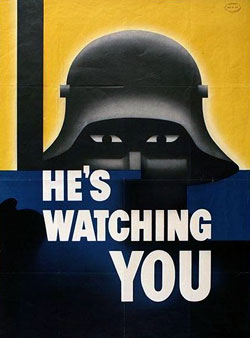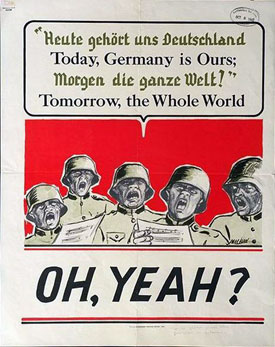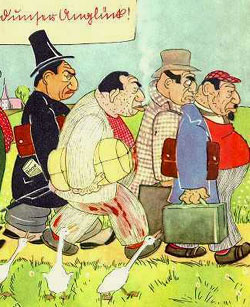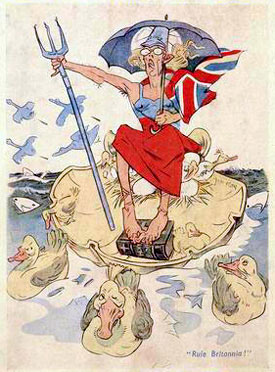
"You can't see his face, but he can see you." Playing upon our fear of the unknown

Unlike dolls, robots, and zombies; people living in the world are fully human. How then can we respond with hatred and distrust, acting in ways that show we believe them to be less than human? Throughout history there are ugly examples of people dehumanizing other ethnic groups. Recall, for example, slavery of blacks in America or Hitler's concentration camps for the Jews. Here, we'll take a look at how the uncanny valley concept might explain how people can be persuaded to act with violence and fear of other ethnic groups.
Recognizing Differences: It's the Way our Minds Work
How
do you tell the difference between an Asian and an American Indian?
Observation of visible differences are important as we identify our
friends and decide how to respond to strangers. In learning to
categorize, children often name things incorrectly until they learn to
see physical differences.
Visual prejudice is a natural response that keeps us from danger or discomfortAdults, too, work from generalized stereotypes until they learn differently. This ability to make quick judgments based on physical appearance is a natural human response that keeps us from unnecessary exposure to danger or discomfort. Sometimes we judge wrongly; a child bitten by a dog may fear contact with all dogs even though some are very friendly. In spite of our errors, we save energy and avoid danger by thinking in group stereotypes rather than making constant individual evaluations.

Many people become uneasy around handicapped people, those who are very ugly or very beautiful, or people with a different cultural background. We may overcome this uneasiness by making an effort to know and interact with the individual. Our initial fearful response of the unpredictable is lessened by familiarity and interaction.
When a group is portrayed as less-than-human, the stage is set for violence
Propaganda often takes psychological advantage of our natural uneasiness to incite fear and violence toward other racial groups. When political leaders portray another group as disgusting, less-than-human, and a threat; then the stage is set for violence. Take for example the U.S. propaganda against German soldiers; faces ugly as zombies and distorted to look like rabid animals.
Racism
Racism and prejudice stem from the fact that we
can see visual physical differences in other people. Just as we
confidently call a wide range of colors "blue" even if they are more
accurately named "teal" or "navy", we can lump people together based on
general physical characteristics.

"One can tell from his eyes that he is a deceitful person"In times of political unrest, catastrophy, or economic recession; visible differences can become the foundation for violence. After all, you must identify the enemy before you can eliminate him. What differences are natural or unnatural? The emotional responses described by the uncanny valley concept imply that we have strong reactions to perceived unnatural qualities in things that look human. Inducing perceptions of a physically unnatural appearnce has often been a propagandis formula for dehumanizing other racial groups.
An example from
Germany
The boy goes on.'One can also recognize a Jew by his
lips. His lips are usually puffy. The lower lip often protrudes. The
eyes are different too. The eyelids are mostly thicker and more fleshy
than ours. The Jewish look is wary and piercing. One can tell from his
eyes that he is a deceitful person.'"
-from How to Tell a
Jew, an anti-Semitic children's story book published in Germany
prior to World War II
Overcoming Psychological Reactions
Every era of
human society has examples of dehumanizing groups of people to justify
or incite inhumane treatment. Slavery, German concentration camps, the
war in Bosnia, and the Hutu/Tutsi conflict in Rwanda are just a few of
the most current examples. Whether the dehumanization ends in massive
violence or just small prejudicial behaviors, it is important to
recognize this subconscious emotional response and find ways to overcome
it.
The same psychology that makes us empathize with a robot or project love onto a doll will enable us to keep humans out of the uncanny valley. Familiarity, knowledge of people as individuals, and prolonged interaction with others outside our social group will foster empathy and reduce the effectiveness of racial propaganda.

Prejudice as seen in the uncanny valley response has a much different meaning when applied to human beings rather than robots.
Just as people interacting with Japanese created android Repliee unconsciously forget she's not a woman, personal interaction helps overcome initial fear or uncertainty in dealing with someone that's different from us.
The foundation of the National Socialist worldview is the
knowledge of human inequality. No one will likely disagree with this as
long as we stick to physical appearance. It is obvious that the "red
skins," the "yellow people," the Negroes and the whites are very
different. And all whites are not the same. The careful observer can
find differences in physical size and shape. The color of the eyes,
hair, and skin also varies greatly.
-from Hitler Youth
Handbook, conveying racial thinking to young boys
Even though the ability to differentiate based on physical appearance is a natural and useful skill, we must always be careful of falling into prejudice. The negative response illustrated by the uncanny valley has a different meaning when applied to human beings rather than robots or other non-living things. Real people aren't supposed to fall below human on the uncanny valley graph, but through propaganda, uncertainty, or fear they can be put there.
MORE ON PREJUDICE AND RACISM:
BIBLIOGRAPHY